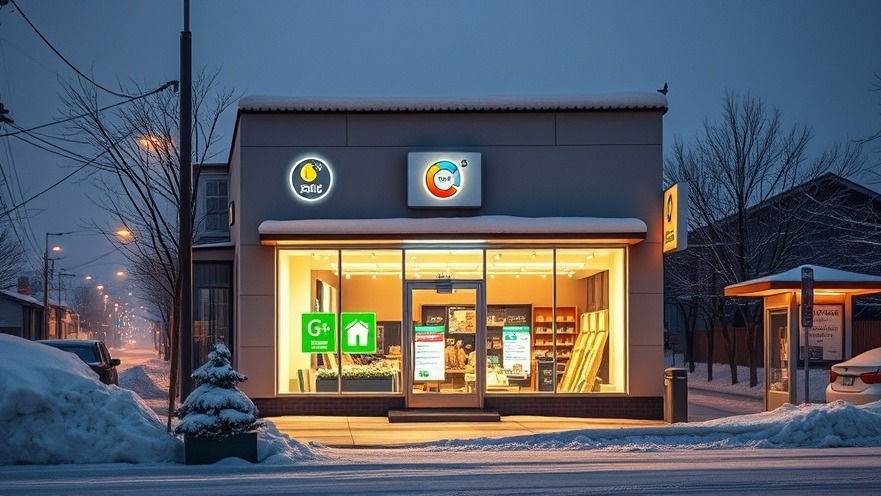
Understanding the Rising Energy Costs: A Franchise Perspective
As winter approaches, franchise owners face not just the chill of the season but also soaring energy costs that threaten to chip away at their profits. With projected heating costs soaring 7.6% to an average of $976, as reported by the National Energy Assistance Directors Association, understanding these increases is paramount. Key factors driving these costs include necessary infrastructure upgrades by utility companies, volatility in the natural gas market, and heightened energy demands from burgeoning data centers that are reshaping our economy.
The Impact of Location on Energy Costs
Geographical differences significantly affect energy expenses. For instance, franchise operations in southern states might see staggering increases of up to 21%, necessitating aggressive cost-saving strategies. In contrast, while northeastern operations might cope with a smaller 7.2% increase, it’s important not to be lulled into complacency; even slight hikes can deeply cut into margins when baseline costs are high. Meanwhile, regions in the Midwest could face alarming increases of 16.4% for natural gas—especially vital information for franchises reliant on gas for heating.
Actionable Strategies for Franchise Owners
This winter, franchise owners can implement several actionable strategies to mitigate costs. Starting with simple adjustments can yield significant savings. For instance, investing in programmable thermostats allows for tailored heating solutions—applying warmer settings in customer zones while minimizing heating in back-of-house areas. Furthermore, transitioning to LED lighting can drastically reduce energy costs due to its lower energy consumption and longer lifespan; many franchises may expect payback periods of just 12-18 months.
Regular Maintenance and Equipment Optimization
Ensuring that heating, ventilation, and air conditioning (HVAC) systems are regularly maintained is non-negotiable. Dirty filters and clogged vents can lead to energy inefficiencies, increasing energy consumption by 20 to 30%. Additionally, franchises should explore smart thermostats enabling efficient energy use, particularly in business operating schedules that vary from peak customer hours to overnight hours.
Integrating Energy Management into Franchise Operations
Energy management must be woven into the daily fabric of franchise operations. This means engaging employees in energy-conscious behaviors, such as powering down unused equipment and adjusting lighting according to natural daylight availability. Implementing energy monitoring systems equipped with real-time feedback can elevate energy management from a passive practice to a proactive strategy.
Financial Planning for Seasonal Energy Costs
It is crucial for franchises to revise their budgets in anticipation of higher energy costs. Rather than waiting for energy bills to spike, proactively integrating estimated energy costs into pricing strategies can help maintain profitability. Although not every cost can be passed onto consumers, understanding operational costs allows businesses to make informed decisions about service pricing and product markups.
Long-term Investment in Energy Efficiency
Franchise owners should approach energy efficiency as a long-term investment rather than a mere expense. Many energy efficiency improvements qualify for tax incentives and utility rebates which can significantly reduce upfront costs while yielding long-term savings. Items such as high-efficiency windows and superior insulation can provide substantial energy and cost benefits over time.
Negotiating Better Terms with Suppliers
Engaging utility providers in negotiations can also yield favorable results. It’s essential to leverage your position as part of a larger customer segment; exploring deregulated markets or fixed-rate plans can block access to peak pricing spikes. Participating in demand response programs may afford franchises credits for reducing energy usage during periods of high demand.
The Bottom Line: Control Your Energy Expenditure
Ultimately, the path to maintaining profitability as energy costs rise lies in proactive energy management. What is often perceived as a fixed expense can be transformed into a controllable variable with sound operational strategies. For franchise owners, winter energy management isn’t just about staying warm; it is a fundamental aspect of ensuring your franchise's financial health throughout the year. Start implementing these strategies today to secure a more sustainable and profitable future.
Smart franchisees recognize that energy management is synonymous with profit management—take control of your energy costs and strengthen the financial foundation of your franchise.
 Add Row
Add Row  Add
Add 




Write A Comment